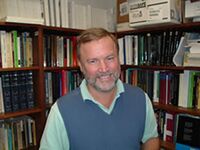Vous pouvez contribuer simplement à Wikibéral. Pour cela, demandez un compte à adminwiki@liberaux.org. N'hésitez pas !
Bruce J. Caldwell
| Bruce J. Caldwell | |||||
| Économiste | |||||
|---|---|---|---|---|---|
| Dates | 1952- | ||||

| |||||
| Tendance | École autrichienne | ||||
| Nationalité | |||||
| Articles internes | Autres articles sur Bruce J. Caldwell | ||||
| Citation | |||||
| Interwikis sur Bruce J. Caldwell | |||||
Bruce J. Caldwell, né en 1952, est professeur d'économie à l'université de Greensboro. Il est également membre du réseau de la faculté FEE (Foundation for Economic Education).
Il a obtenu son doctorat d'économie en 1979, à l'université du North Carolina – Chapel Hill en soutenant une thése portant sur la pensée méthodologique en économie « Recent Methodological Thought in Economics: Survey and Critique from a Philosophy of Science Perspective » sous la direction de Vincent J. Tarascio. De 1979 à 1981, il fut professeur assistant à l'université de Greensboro avant de suivre des études post-doctorales de 1981 à 1982 à New York University. De 1982 à 1987, il est de nouveau professeur associé à l'université de Greensboro. Il obtient le titre de professeur à partir de 1987.
Il est membre du comité éditorial de nombreuses revues scientifiques et universitaires dont le Journal of the History of Economic Thought, Atlantic Economic Journal, The Review of Austrian Economics, The Southern Economic Journal, The Journal of Economic Methodology, History of Political Economy, et Research in the History of Economic Thought and Methodology
Il est spécialiste de l'école autrichienne, notamment sur la partie méthodologique. Il a fait de nombreuses recherches sur les contributions intellectuelles de Friedrich Hayek et de Karl Popper, débattant, entre autres, avec les méthodologistes poppériens comme Mark Blaug et Terence Hutchison.
Publications
- Pour une liste détaillée des œuvres de Bruce Caldwell, voir Bruce Caldwell (bibliographie)
Littérature secondaire
- 1986, Eugene Rotwein, "Flirting with Apriorism: Caldwell on Mises", History of Political Economy, 18, pp669-673
- 1994, Theodore Burczak, "Reply to Bruce Caldwell: Can Subjectivism be Non-Hermeneutic?", Economics and Philosophy, 10:2, pp315-317
- Repris en 2000, In: Peter Boettke, dir., The Legacy of Friedrich von Hayek, Edward Elgar
- 1998, Karen Vaughn, commentaire du livre de Bruce Caldwell, dir., "The Collected Works of F. A. Hayek", Vol. 10: Socialism and War: Essays, Journal of the History of Economic Thought, Vol 20, n°2, pp235-237
- 2004,
- Mark Pennington, commentaire du livre de Bruce Caldwell, "Hayek's challenge: an intellectual biography of F. A. Hayek", Economic affairs: journal of the Institute of Economic Affairs, Vol 24, n°3, p78
- Warren J. Samuels, Commentaire du livre de Bruce Caldwell, "Hayek's Challenge", Journal of Economic Litterature, Vol 42, juin, pp840-841
- Jason Steorts, "The Austrian Teacher", commentaire du livre de Bruce Caldwell, "Hayek's Challenge: An Intellectual Biography of F. A. Hayek", National Review, 23 février 2004
- 2005,
- Alan Ebenstein, Commentaire du livre de Bruce Caldwell, "Hayek's Challenge", NYU Journal of Law & Liberty, Vol 1, n°0, pp304-313
- Andrew Gamble, commentaire du livre de Bruce Caldwell, "Hayek’s Challenge: An intellectual biography", Journal of the history of the behavioral sciences, Vol 41, n°2, p187
- Viktor Vanberg, commentaire du livre de Bruce Caldwell, "Hayek's Challenge – An Intellectual Biography of F. A. Hayek", Economics and Philosophy, vol 21, n°2, octobre, pp333-339
- 2006,
- Erik Angner, "Response to Caldwell and Reiss's “Hayek, Logic, and the Naturalistic Fallacy”", Journal of the History of Economic Thought, Vol 28, n°3, pp371-373
- Giampaolo Garzarelli, "Bruce Caldwell, Hayek's challenge: An intellectual biography of F.A. Hayek, European Journal of Political Economy, vol. 22(4), décembre, pp1019-1022
- Roger Koppl, Commentaire du livre de Bruce Caldwell, "Hayek’s Challenge: An Intellectual Biography of F. A. Hayek", Journal of Economic Behavior and Organization, 59(2), pp287-291
- Simon Marginson, "Neo qualms" (Commentaire du livre de Bruce Caldwell, Hayek’s Challenge: An Intellectual Biography of F.A. Hayek, Australian Book Review, juin/juillet, Vol 282, pp12-15
- 2007, Philip Mirowski, "Naturalizing the market on the road to revisionism: Bruce Caldwell's Hayek's challenge and the challenge of Hayek interpretation", Journal of Institutional Economics, vol 3, n°3, décembre, pp351-372
Liens externes
- (en) page personnelle de Bruce J. Caldwell à Duke University
| Accédez d'un seul coup d’œil au portail économie. |